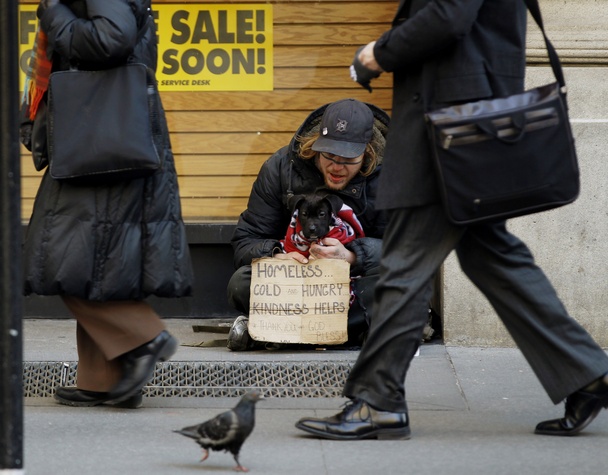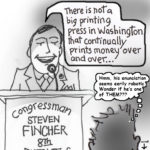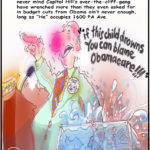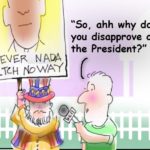In a nation that prides itself on democracy and equality, one finds many defenders of elitism and inequality among some conservatives, most libertarians, and especially objectivists. In a capitalist nation, one that often worships economic success above morality, one can find religious defenses of amorality going back pretty far. Al Carroll asks the question, how did we get here?


Defenders of Inequality: The Moral and Practical Failures of Libertarianism and Small Government Conservatism
By Al Carroll, Published in CounterPunch
In economics, both orthodox Communism and Libertarianism are equally wrong, callous, and dangerous examples of ideological blindness, a set of principles taken to an extreme that caused many people to die. Both are more alike than either set of fanatics (as both set of true believers are) would want to admit. Both fall back on the same defense of “there has never been a true or pure form” of their system. Both systems clearly failed. Communism only lasted 70 years in the first nation to have it, and killed tens of millions with purely man made famines and extreme repression. Libertarianism and its influence on US conservatism takes the greatest share of blame for extreme economic inequality, the Great Recession, and most financial elite crime waves of the past 30 years.
The question then becomes, to what degree should there be a mixed system? The slogans of libertarians and many conservatives that “government is the problem” or “regulation doesn’t work” are easily proven wrong, and fairly foolish falsehoods. This article argues some basic humanitarian principles should be applied to economics and the human and humane spheres or politics, ones so obvious it seems absurd to have to make them explicit:
- Helping people obviously helps people more than not helping them.
- Watching out for and preventing or stopping abuse and harm is obviously better than not watching and not stopping abuse and harm, or even refusing to look and denying harm exists.
- Generosity and selflessness are obviously better than stinginess and selfishness,
- Democratic control obviously is better than elite control.
And yet, in a nation that prides itself on democracy and equality, one finds many defenders of elitism and inequality among some conservatives, most libertarians, and especially objectivists. In a capitalist nation, one that often worships economic success above morality, one can find religious defenses of amorality going back pretty far.
Anti-Government Public Protection Roll-Back = Deaths
The overturning or limiting of anti poverty, banking, public health, environmental, labor, and safety laws since the 1980s and the blocking of gun control, done for conservative ideological reasons or to benefit large corporations, resulted in huge losses of lives in the US. Those presidents partly responsible include not only Reagan, Bush Sr., and GW Bush, but also Clinton.
The trouble arises due to the apparent greed of the those who populate the upper crust. — Eli Levine
The body count from anti government dogma far exceeds all wars in US history:
- Up to 875,000 preventable deaths per year, or over one third of all deaths in the US.
- At least 26,000 preventable deaths from poor healthcare or lack of healthcare each year.
A heavily disputed number of preventable deaths from lack of effective gun control includes both murders and a far higher number of gun suicides. The number of deaths prevented by guns is much smaller, and exaggerated by industry lobbyists by as much as a hundredfold. Part of the reason for disputes about how many lives may be saved by gun control is the NRA successfully blocks government health research on firearms deaths.
An unknown number of earlier deaths from increased poverty because of financial deregulation, causing the Great Recession of 2007-2012, the dot.com collapse of the 1990s, the savings and loan scandal of the 1980s, and the housing market collapse, the banking and mortgage crisis, the insurance industry crisis, and the Worldcom and Enron scandals in the 2000s.
STORY: Lessons in Peaceful Civil Disobedience: Occupy Los Angeles
Who Gets the Blame?
The country’s turn to the right is often blamed, but this is too broad a claim. There are many cases of conservative support for government regulation of personal freedom. Some conservatives favor regulation of everything people do below the waist, except with the money in their wallet.
Corporations pushing for deregulation for their own profit or from ideological blindness that imagine regulation costs profits is often blamed. But the US is almost unique in this mindset among business elites. Most nations have corporate elites that accept government roles, often working with them as partners. In every other nation except for Britain, modern industry was developed by the government. It’s worth noting, most of the more successful economies today are mixed.
The National Rifle Association, which does not represent most gun owners, or even their own membership, is often blamed for blocking efforts to prevent gun deaths. Most NRA members favor background checks and bans on assault weapons. The NRA actually represents gun manufacturers, and thus promotes conspiracy theories about gun confiscation that do not exist. These theories sell more guns to the paranoid and the gullible. But still, the NRA’s hostility is only part of the Libertarian mindset, and is relatively recent. The younger readers might be surprised to know that the NRA did not get involved in politics until the 1970s, and into the late 80s endorsed some forms of gun control.
Libertarians and especially the Ayn Rand cult of Objectivism rightly should get most of the blame for small government ideology’s influence. Except for the Federal Reserve, neither group had much influence until after the 2008 elections, when they were promoted by Republican leadership. Both groups prove to be enormously self destructive for conservatism because of their uncompromising ideological blindness, fighting within the Republican Party as much as against their political opponents.
A libertarian society, if fully realized, would be actively hostile to the development of free selves. — Kim Messick in Salon
Calvinism and its belief in predestination may be the ultimate reason for small government ideology’s success in the US. America was colonized predominantly by Protestants, many of them believers in predestination. Predestination divides humanity into saints and sinners, those destined to go to heaven and those bound for hell. How does one tell the saints from the sinners? The saints have money. Sinners are poor because of their sin. Seriously, this is what some churches taught, and one can see variations of this belief today every time there is a rant scapegoating those on welfare. A belief that equates wealth with “natural virtue” and poverty with sin inevitably fails to punish the wealthy for their crimes, and leads to a culture of lawlessness among financial elites.
Prosperity Theology and the Worship of Wealth
Besides Calvinism’s corrosive influence, there were men like William Graham Sumner, who proclaimed, “A drunkard in the gutter is where he ought to be.” Some churches began preaching prosperity theology in the twentieth century, turning Christian belief on its head. The Cold War and hysteria over Communism showed US elites completely misreading the level of threat it actually posed. From American Indians to early Mormons to socialists to hippies, American elites have always demonized anyone who does not worship at the altar of wealth.
Ayn Rand was probably the most extreme example of sociopathic belief when it comes to the worship of wealth. A refugee from Communism and a self hating Jew named Alisa Rosenbaum, Rand wrote several bloated novels that enamored a small but devoted cult, and literally no one else. A pop philosopher who had no effect on the philosophy field, and an awful novelist who had no admirers in literary circles, Rand’s appeal is to very sheltered well off individuals with a fantasy image of themselves as persecuted.
The simplest way to describe her sociopathy is to describe her novels. Her hero was a rapist and terrorist who bombed public housing, made painfully bad 30 page speeches, demonized all religion and compassion, and deluded himself into thinking society would collapse without elites. Rand gloried over the mass of humanity starving until they, from her point of view, “learned their lesson” and sunk back into subservience, recognizing they existed only to serve elites.
Libertarians are not bothered by (much less suspicious of) economic power [as opposed to governmental power] — even in its most concentrated forms — because they think of it as, at bottom, an expression of freedom. Like any form of voluntary association, the market simply reflects the autonomous choices of its various participants. — Kim Messick
The strongest criticism one can make of the more libertarian version of conservatism is quite simply, it is un-Christian. Rand was just the most extreme example of that, even influencing the Satanic Church. Some conservative followers abandon Christian beliefs for conservatism. Conservative Christians, as their self chosen label indicates, put conservatism before Christianity. They are CINOs, or Christians In Name Only. For who would Jesus let go hungry? Who would Jesus let die from lack of healthcare? How many would Jesus let be shot in bar brawls or school shootings?
Free Market Absolutism
The most malignant form of conservatives do stand proudly for literally letting people die on the street. They insist the mythical “free market” is absolute, arguing against all evidence that neither regulation nor government can ever work. Some critics have recently taken to calling them anarchists as an insult. But anarchists are populists, not elitists. A more accurate label is free market fundamentalists, for the market is certainly their religion far more than any church.
Their belief comes from faith, not evidence. To claim regulation never works? Which one, of the many? The clearest evidence of some regulation working is as obvious as the traffic light keeping you from being hit by another car, or the airplane you fly in not crashing because of air traffic controllers. To claim government never works? All of it? The clearest evidence of a government somewhat working is that it has not been replaced or collapsed.
Regulation can easily be largely trivial in the supposed harm it causes, deregulation often inherently destructive. Regulation can be either good or bad depending on how structured, but demonization of the term is simply a ruse to get the public to hate government, which in practical terms means the public is being taught to hate democracy, and thus distrust themselves. Such a practice serves elite needs, for it means the public will either stop caring about democracy, or distrust those who care.
Deregulation can often kill, lead to greater poverty and hardship, lead to higher death rates from preventable disease, crime, preventable deaths from workplace accidents, higher child death rates, and earlier deaths for senior citizens. Here is where ideology must confront reality. So called “dependence on government” may be argued to be morally right, or harmful. But to call it “dependence” is itself a twisting of reality. We all depend on government for a wide range of things, from police to hospitals to fire protection to retirement to defense against (largely imaginary) foreign invasions. Interdependence is a good thing, for it binds a society together. What libertarians imagine is independence is isolation.
The current wave of militia terrorists are animated by paranoia about government, believing in ludicrous conspiracy theories. No amount of persuasion or actual facts can reach them, anymore than anyone else conspiracy minded. So to their delusions, a corporate welfare cheat like [Cliven] Bundy having to follow the law like everyone else is “tyranny.” — Al Carroll in Daily Kos
Only the most fanatically libertarians would claim we would be better off with private fire departments for example, especially since we know from bitter experience in the past they were incredibly incompetent and corrupt. Even libertarian icon Milton Friedman did not call for a privatized military, and we also know from bitter experience how poorly mercenaries worked in Iraq. To falsely claim that “dependence on government” is a bad thing, one has to pretend that in a democracy the mass of ordinary people are separate from their government when they are one and the same.
Fiscal Austerity Kills
A look at the realities not blinded by politics shows that fiscal austerity often kills. A supposedly freer society, one without a social safety net, clearly leads to many more deaths. A libertarian or conservative may argue that such freedom is desirable. But they also need to be able to defend their own moral callousness in defending sending the most vulnerable to early deaths.
Poverty is the most reliable predictor of early death. Even conservatives and libertarians are fond of pointing this out. However, based on their ideology, they assume deregulation leads to greater prosperity economically. By that measure, Somalia should be the wealthiest nation on the planet and Sweden the poorest. But this is virtually the opposite of reality.
Poverty rates can and have been dramatically reduced by governments. The War on Poverty dramatically reduced poverty under Johnson and Nixon, and other regulations saved many by making the air and water cleaner. Every country in Scandinavia has little poverty precisely because of government intervention. The Bolivarian nations of Latin America also have a record where poverty has been cut by more than half and extreme poverty by even more. We also know that government healthcare does work, has worked in every nation that has it better than capitalism possibly could. It is just a shame that instead so far all we have is corporate welfare for insurance companies, a plan designed by conservative Republicans.
Government intervention also stops financial crashes. Canada has never had a banking crash, compared to the US, which had sixteen financial collapses. Even within the US, one can point to North Dakota. North Dakota has a state run bank, which free market fundamentalists would no doubt label, somewhat correctly, socialist. The state bank began during the Great Depression, and the state can claim its bank as a reason they did far better than the rest of the US during the Great Recession. It is also important to note, very few credit unions failed, while many for profit banks did.
Yet even the blindness on limiting the everyday brutalities of capitalism cannot compare to the blindness and lack of understanding on the history of firearms in US history. There are perfectly valid reasons for gun ownership, such as hunting. Even self-defense can be a valid argument, but not for blind unthinking gun worship. Guns rights defenders should not argue from ignorance of the cause they believe in, or from irrational conspiracy theories. No one, virtually no major organization or political leader seeks to ban all guns. Gun groups have put their cause in the bizarre situation of even defending wife beaters’ alleged “right” to have a gun. Such an approach will backfire, leading to stricter regulation down the line.
Deregulation and Presidential Ideologies
What role did presidents play in deregulation, in letting each of these series of laws loosen and large numbers of deaths result? Which were the most ideologically blind? The list of blame includes both parties:
Ronald Reagan spent most of his career, for almost 30 years before he became president, as a corporate shill for deregulation. When his movie career died, he was a spokesman for General Electric. In the 1960s he gave a series of notorious speeches as a shill for the American Medical Association, claiming if Medicare became law, Americans would tell their children “what it once was like in America when men were free.” For welfare, Reagan invented two notorious race baiting lies. The first was a Black “welfare queen” who supposedly lived in luxury stealing hundreds of thousands. The woman actually stole $8,000. The second was a speech about “young bucks” (a derogatory term for young Blacks) buying steaks on welfare.
Reagan ended the successful War on Poverty programs of both Johnson and Nixon. He cut taxes for the very wealthy. The greater inequality we have today, at its most unequal since the Great Depression, began under Reagan. He gutted financial regulation, leading directly to the Savings and Loan Scandal that cost $160 billion.
Reagan and George H. W. Bush Sr. both practiced high deficit spending deliberately. The anti poverty programs were too popular to entirely end, and both wanted both low taxes on wealthy elites and the highest defense spending seen since World War II. Deficit spending was a tactic to limit anti poverty programs. The end of the Cold War brought a slightly smaller military, but not a smaller deficit.
Bill Clinton was every bit as much a conservative on economic issues as Reagan and Bush. Clinton’s deregulation led directly to the Great Recession and financial scandals of the 2000s. He repealed Glass-Steagall, an act that had regulated banks since the Great Depression. He signed other laws that allowed credit default swaps and gave banks looser rules in lending to low income areas. Clinton also took a leading role in cutting public assistance, adding to human misery.
George W. Bush pulled FBI agents off investigating insider trading and financial fraud in order to track down terrorists’ financial networks. Wanting to do the latter is certainly understandable and the right thing to do, except that in his own words, he did not care about tracking down Bin Laden.
Under Barack Obama, there has been more of a mixed picture. Unlike Roosevelt, Obama did not jail or even try to charge lawless financial elites. Both GW Bush and Obama bailed out banks, insurance companies, and in Obama’s case, also the auto industry. The many Americans who lost their homes or most of their home’s value were not bailed out, though some got limited help. (Racists such as Rush Limbaugh chose to blame the victims, mostly minority and lower income.) Obama did provide some relief for student loans, did get the tax rate raised slightly for the wealthiest, and at this writing is trying to raise the minimum wage. But none of the underlying problems with the financial system were solved. There is no reason another crash may not happen again five to fifteen years from now.
The biggest change recently is that, thanks to the Occupy Wall Street movement, the public recognizes inequality. The public realizes elites are preaching class warfare of the well off against everyone else. Mitt Romney, running for president in 2012, notoriously said, “There are 47 percent…dependent upon government, who believe that they are victims, who believe the government has a responsibility to care for them….My job is not to worry about those people.” The comment, recorded at a secretive meeting of financial elites, likely cost him the election, as it should have.
It is difficult to think of a more un-Christian sentiment, to boldly proclaim you are not your brother’s keeper and hold the poorer half of the nation in contempt. That is the ultimate moral argument against Libertarianism. “What would Jesus do?” says the popular evangelical slogan. Jesus would never have been a libertarian, nor preached small government or free market fundamentalism.
Al Carroll is Assistant Professor of History at Northern Virginia Community College, a former Fulbright Scholar, and the author of Presidents’ Body Counts: The Twelve Worst and Four Best American Presidents Based on How Many Lived or Died Because of Their Actions. More information is at http://alcarroll.com.












